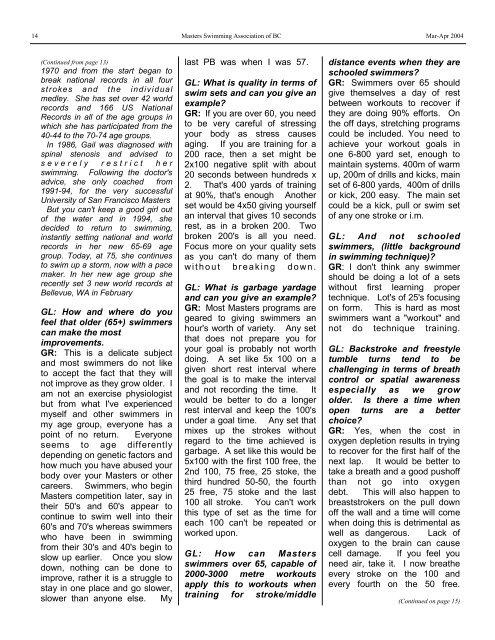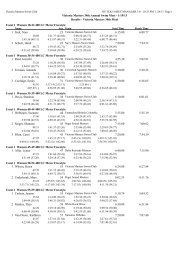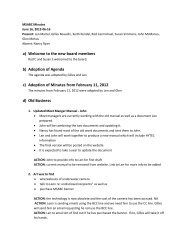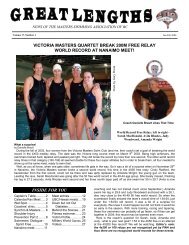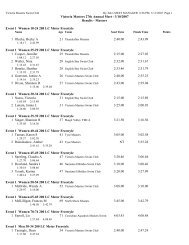Great Lengths - Masters Swimming Association of British Columbia
Great Lengths - Masters Swimming Association of British Columbia
Great Lengths - Masters Swimming Association of British Columbia
Create successful ePaper yourself
Turn your PDF publications into a flip-book with our unique Google optimized e-Paper software.
14 <strong>Masters</strong> <strong>Swimming</strong> <strong>Association</strong> <strong>of</strong> BC<br />
Mar-Apr 2004<br />
(Continued from page 13)<br />
1970 and from the start began to<br />
break national records in all four<br />
strokes and the individual<br />
medley. She has set over 42 world<br />
records and 166 US National<br />
Records in all <strong>of</strong> the age groups in<br />
which she has participated from the<br />
40-44 to the 70-74 age groups.<br />
In 1986, Gail was diagnosed with<br />
spinal stenosis and advised to<br />
severely restrict her<br />
swimming. Following the doctor's<br />
advice, she only coached from<br />
1991-94, for the very successful<br />
University <strong>of</strong> San Francisco <strong>Masters</strong><br />
But you can't keep a good girl out<br />
<strong>of</strong> the water and in 1994, she<br />
decided to return to swimming,<br />
instantly setting national and world<br />
records in her new 65-69 age<br />
group. Today, at 75, she continues<br />
to swim up a storm, now with a pace<br />
maker. In her new age group she<br />
recently set 3 new world records at<br />
Bellevue, WA in February<br />
GL: How and where do you<br />
feel that older (65+) swimmers<br />
can make the most<br />
improvements.<br />
GR: This is a delicate subject<br />
and most swimmers do not like<br />
to accept the fact that they will<br />
not improve as they grow older. I<br />
am not an exercise physiologist<br />
but from what I've experienced<br />
myself and other swimmers in<br />
my age group, everyone has a<br />
point <strong>of</strong> no return. Everyone<br />
seems to age differently<br />
depending on genetic factors and<br />
how much you have abused your<br />
body over your <strong>Masters</strong> or other<br />
careers. Swimmers, who begin<br />
<strong>Masters</strong> competition later, say in<br />
their 50's and 60's appear to<br />
continue to swim well into their<br />
60's and 70's whereas swimmers<br />
who have been in swimming<br />
from their 30's and 40's begin to<br />
slow up earlier. Once you slow<br />
down, nothing can be done to<br />
improve, rather it is a struggle to<br />
stay in one place and go slower,<br />
slower than anyone else. My<br />
last PB was when I was 57.<br />
GL: What is quality in terms <strong>of</strong><br />
swim sets and can you give an<br />
example?<br />
GR: If you are over 60, you need<br />
to be very careful <strong>of</strong> stressing<br />
your body as stress causes<br />
aging. If you are training for a<br />
200 race, then a set might be<br />
2x100 negative split with about<br />
20 seconds between hundreds x<br />
2. That's 400 yards <strong>of</strong> training<br />
at 90%, that's enough Another<br />
set would be 4x50 giving yourself<br />
an interval that gives 10 seconds<br />
rest, as in a broken 200. Two<br />
broken 200's is all you need.<br />
Focus more on your quality sets<br />
as you can't do many <strong>of</strong> them<br />
without breaking down.<br />
GL: What is garbage yardage<br />
and can you give an example?<br />
GR: Most <strong>Masters</strong> programs are<br />
geared to giving swimmers an<br />
hour's worth <strong>of</strong> variety. Any set<br />
that does not prepare you for<br />
your goal is probably not worth<br />
doing. A set like 5x 100 on a<br />
given short rest interval where<br />
the goal is to make the interval<br />
and not recording the time. It<br />
would be better to do a longer<br />
rest interval and keep the 100's<br />
under a goal time. Any set that<br />
mixes up the strokes without<br />
regard to the time achieved is<br />
garbage. A set like this would be<br />
5x100 with the first 100 free, the<br />
2nd 100, 75 free, 25 stoke, the<br />
third hundred 50-50, the fourth<br />
25 free, 75 stoke and the last<br />
100 all stroke. You can't work<br />
this type <strong>of</strong> set as the time for<br />
each 100 can't be repeated or<br />
worked upon.<br />
GL: How can <strong>Masters</strong><br />
swimmers over 65, capable <strong>of</strong><br />
2000-3000 metre workouts<br />
apply this to workouts when<br />
training for stroke/middle<br />
distance events when they are<br />
schooled swimmers?<br />
GR: Swimmers over 65 should<br />
give themselves a day <strong>of</strong> rest<br />
between workouts to recover if<br />
they are doing 90% efforts. On<br />
the <strong>of</strong>f days, stretching programs<br />
could be included. You need to<br />
achieve your workout goals in<br />
one 6-800 yard set, enough to<br />
maintain systems. 400m <strong>of</strong> warm<br />
up, 200m <strong>of</strong> drills and kicks, main<br />
set <strong>of</strong> 6-800 yards, 400m <strong>of</strong> drills<br />
or kick, 200 easy. The main set<br />
could be a kick, pull or swim set<br />
<strong>of</strong> any one stroke or i.m.<br />
GL: And not schooled<br />
swimmers, (little background<br />
in swimming technique)?<br />
GR: I don't think any swimmer<br />
should be doing a lot <strong>of</strong> a sets<br />
without first learning proper<br />
technique. Lot's <strong>of</strong> 25's focusing<br />
on form. This is hard as most<br />
swimmers want a "workout" and<br />
not do technique training.<br />
GL: Backstroke and freestyle<br />
tumble turns tend to be<br />
challenging in terms <strong>of</strong> breath<br />
control or spatial awareness<br />
especially as we grow<br />
older. Is there a time when<br />
open turns are a better<br />
choice?<br />
GR: Yes, when the cost in<br />
oxygen depletion results in trying<br />
to recover for the first half <strong>of</strong> the<br />
next lap. It would be better to<br />
take a breath and a good push<strong>of</strong>f<br />
than not go into oxygen<br />
debt. This will also happen to<br />
breaststrokers on the pull down<br />
<strong>of</strong>f the wall and a time will come<br />
when doing this is detrimental as<br />
well as dangerous. Lack <strong>of</strong><br />
oxygen to the brain can cause<br />
cell damage. If you feel you<br />
need air, take it. I now breathe<br />
every stroke on the 100 and<br />
every fourth on the 50 free.<br />
(Continued on page 15)


